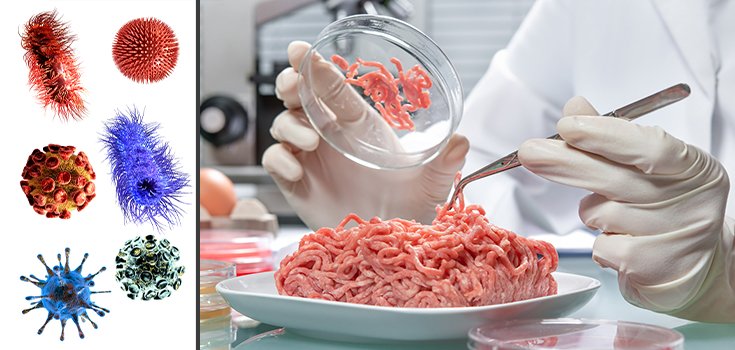Study: Most Supermarket Meats Contain Antibiotic-Resistant Superbugs

In a report published in late June 2018, the Environmental Working Group (EWG) said it found that about 80% of meat sold in U.S. supermarkets contains antibiotic-resistant superbugs. [1]
The non-profit environmental research organization said the superbugs were resistant to at least 1 of 14 antibiotics tested in 2015 by the National Antimicrobial Resistance Monitoring System, a federal-public health partnership.

Superbugs were found on:
- 79% of ground turkey samples
- 71% of pork chops
- 62% of ground beef
- 36% of chicken breasts, wings, and thighs
The report’s author and nutritionist, Dawn Undurraga, said in a news release:
“Consumers need to know about potential contamination of the meat they eat, so they can be vigilant about food safety, especially when cooking for children, pregnant women, older adults or the immune-compromised.”
Dr. Gail Hansen, a public health consultant and veterinarian, explained the risks associated with antibacterial-resistant bacteria found in meat.
“Bacteria transfer their antibiotic-resistance genes to other bacteria they come in contact with in the environment and in the gastrointestinal tract of people and animals, making it very difficult to effectively treat infections.” [2]
The authors point out in the report that the U.S. continues to allow meat producers to give healthy animals antibiotics, despite the fact that the practice is one of the main drivers behind antibiotic resistance.

Dr. Brad Spellberg, chief medical officer at the Los Angeles County and University of Southern California Medical Center, commented:
“When one person or group misuses antibiotics, they cause resistance to the antibiotics to spread, hurting everyone in society. It’s not acceptable for one group of people to profit by hurting everyone else in society.”
Read: Factory Farm Antibiotics Making Children “Allergic to Fruits and Vegetables”
What to Do to Avoid Bacteria in Supermarket Meat Products

In 2017, the FDA banned the use of antibiotics to help livestock gain weight. Under the rule, meat producers who want to give their animals antibiotics must obtain a prescription from a veterinarian to do so. However, meat producers are still permitted to give antibiotics to healthy animals for disease prevention.
One of the best ways to avoid consuming superbug-infested meat – and to stem the number of antibiotics used on farms as well as slow the spread of drug resistance – is to buy organic meat and meat raised without antibiotics, Undurraga said.
Another step people can take is to follow EWG’s tip sheet on how to avoid superbugs in meat. The guide teaches shoppers how to accurately identify meat raised without antibiotics, among other things. [2]
The EWG is calling on the U.S. Food and Drug Administration (FDA) to take action to fix the problem.
Undurraga said:
“The public shouldn’t have to wait until 100 percent of the bacteria found on meat are untreatable with antibiotics before the FDA takes strong action. Now is the time for the FDA to get medically important antibiotics off factory farms.”
Sources:
[1] HealthDay
[2] EcoWatch
